Juicy Couture, established in 1995 by Pamela Skaist-Levy and Gela Nash-Taylor, transformed the landscape of luxury casual wear with its signature velour tracksuits, which debuted in 2001. These tracksuits quickly gained traction among celebrities such as Madonna, Paris Hilton, and Britney Spears, becoming emblematic of the early 2000s celebrity culture and the aesthetic of "new money." However, the brand encountered difficulties following the 2008 recession, resulting in changes in ownership and a number of store closures. A resurgence commenced in 2016, marked by collaborations and a revival of Y2K aesthetics that resonated with nostalgia-driven consumers. This intricate history showcases Juicy Couture's resilience and adaptability, revealing a rich narrative of its evolving identity in the fashion industry.
Brand Origins and Early Years
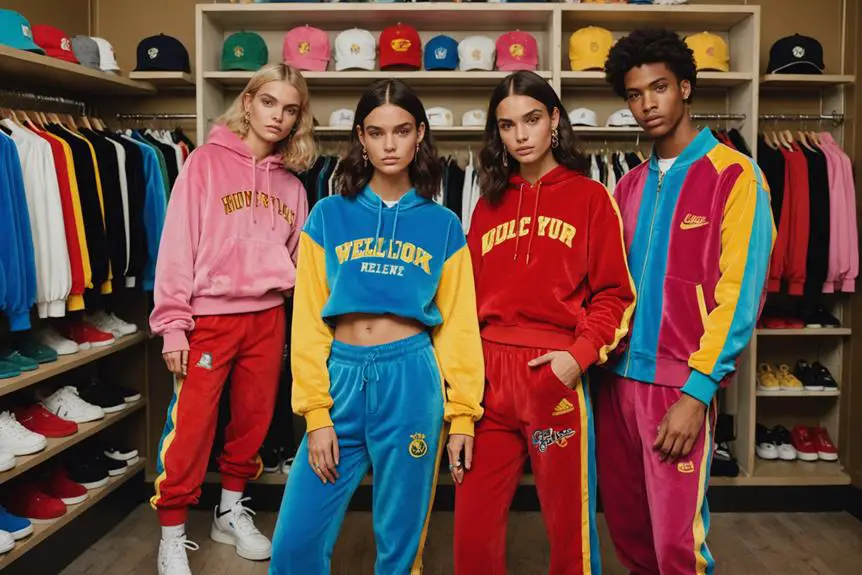
Juicy Couture burst onto the fashion scene in 1995, when Pamela Skaist-Levy and Gela Nash-Taylor founded the brand in Los Angeles. Originally starting as a maternity clothing line under the name Travis Jeans, they quickly realized a gap in the market for contemporary casual apparel. By 1996, they rebranded, shifting their focus to luxury casual wear. This pivotal decision laid the groundwork for what would become a fashion phenomenon.
The brand's early years were marked by a commitment to quality and comfort, leading to the introduction of luxury V-neck shirts. However, the true game-changer came in 2001 with the launch of the iconic velour tracksuit, priced at $155. This product elevated loungewear to chic status, appealing to a wide range of consumers.
Juicy Couture's rapid rise in popularity was greatly influenced by strategic celebrity endorsements, particularly from stars like Paris Hilton and Britney Spears. Their visibility helped the brand capture consumer attention, propelling it into mainstream fashion. By 2008, Juicy Couture had achieved peak sales of approximately $605 million, solidifying its status as a prominent player in the luxury casual wear market.
Rise of the Velour Tracksuit
When the velour tracksuit was introduced in 2001, it marked a transformative moment in loungewear fashion, elevating comfort to a new level of chicness. Designed for Madonna, these tracksuits quickly became synonymous with Juicy Couture and transformed the way people viewed casual wear. Featuring soft velour fabric and the signature "Juicy" embroidery, they captured the essence of early 2000s celebrity culture.
The velour tracksuit didn't just dominate wardrobes; it shaped fashion trends and became a cultural icon. Its popularity surged, representing the "new money" lifestyle and mirroring the glamour of pop culture. Celebrities flaunted these tracksuits in various media, further entrenching them in the collective consciousness.
| Aspect | Details |
|---|---|
| Year Introduced | 2001 |
| Target Celebrity | Madonna |
| Key Features | Soft velour, J zipper, "Juicy" |
| Cultural Significance | Symbol of new money lifestyle |
| Resurgence Influence | Nostalgia for Y2K fashion trends |
Even though the tracksuit waned in the 2010s, its recent resurgence showcases the power of nostalgia and the cyclical nature of fashion.
Celebrity Endorsements and Influence
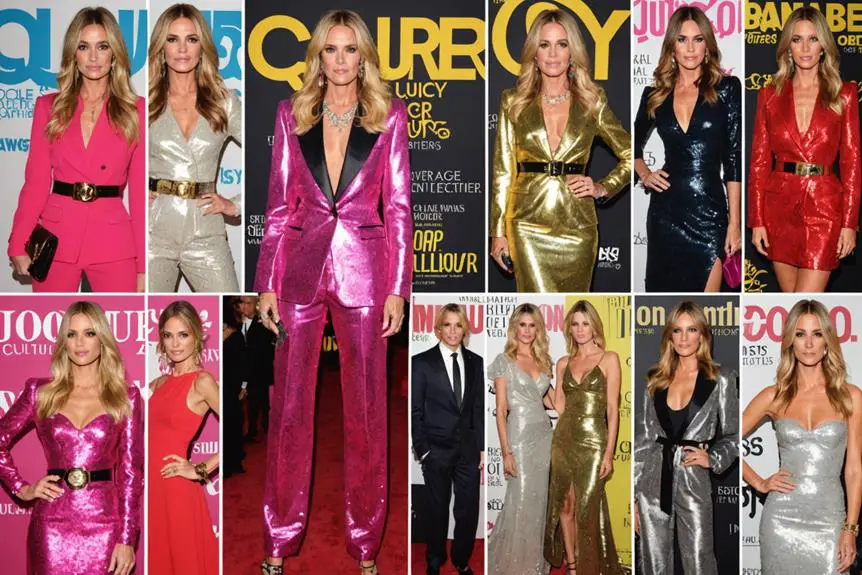
Celebrity endorsements played a pivotal role in catapulting Juicy Couture into the fashion spotlight during the early 2000s. Stars like Paris Hilton and Britney Spears were often spotted flaunting the brand's iconic velour tracksuits, which created a buzz that resonated throughout the fashion industry. This visibility transformed Juicy Couture into a must-have label, as fans sought to emulate their favorite celebs.
Madonna further amplified the brand's appeal when she donned a custom tracksuit in 2001, marking a significant endorsement that captured media attention. Additionally, Juicy Couture's strategic celebrity gifting guaranteed that influencers consistently showcased the brand, leading to increased tabloid coverage and a cultural phenomenon around their tracksuits.
The tracksuit's presence in popular films like "Mean Girls" and "Legally Blonde" solidified its status as a fashion staple, intertwining the brand with critical moments in pop culture. Even today, collaborations with modern influencers like Kylie Jenner reveal Juicy Couture's adaptability, maintaining its relevance in a constantly evolving fashion landscape. Through these celebrity endorsements, Juicy Couture not only shaped trends but also established itself as a lasting influence in the industry.
Expansion and Market Growth
As the early 2000s unfolded, Juicy Couture capitalized on its burgeoning popularity and began to expand its market presence considerably. The brand's velour tracksuit became a cultural phenomenon, driving peak sales of approximately $605 million by 2008. This success was partly fueled by its strategic distribution in upscale department stores like Saks on Fifth Avenue and the opening of its first brick-and-mortar store in Caesars Palace, Las Vegas, in 2004.
Following its acquisition by Liz Claiborne in 2003 for $226 million, Juicy Couture experienced significant growth, doubling its net sales from 2006 to 2007. Even during the 2008 recession, when many brands struggled, Juicy Couture maintained its market presence by focusing on comfort-driven purchases that resonated with consumers facing economic uncertainty.
In 2013, after selling to Authentic Brands Group for $195 million, Juicy Couture shifted its strategy. Collaborations with major retailers like Kohl's and JCPenney allowed the brand to reach a broader audience, further solidifying its expansion efforts. Through these initiatives, Juicy Couture not only adapted to market changes but also expanded its brand identity and accessibility.
Challenges and Setbacks
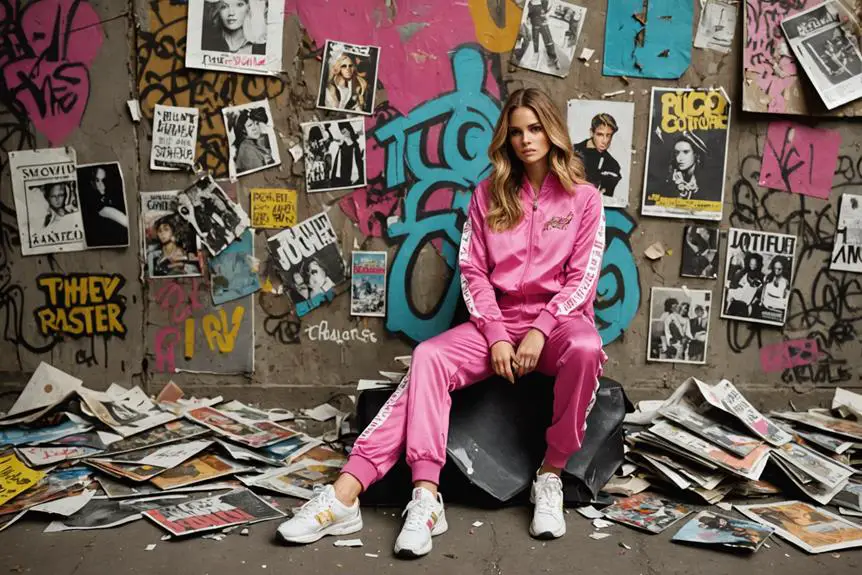
Frequently, brands face challenges that test their resilience, and Juicy Couture was no exception. The brand's journey marked a notable decline, particularly post-2008 recession, when luxury fashion lost its appeal. This shift led to an 11% year-over-year sales drop in 2009.
Key challenges included:
- Leadership Changes: Founders Pamela Skaist-Levy and Gela Nash-Taylor departed in 2010, expressing dissatisfaction with the brand's direction amid declining sales and evolving fashion trends.
- Ownership Shift: After being sold to Authentic Brands Group in 2013 for $195 million, Juicy Couture faced significant hurdles, including the closure of all U.S. flagship stores by June 2015.
- Market Competition: Competing against rising athleisure brands, Juicy Couture struggled to maintain its luxury perception. Partnerships with discount retailers like Kohl's further diluted its brand identity.
Despite attempts to revive the brand, such as a collaboration with Vetements in 2016, Juicy Couture continually grappled with adapting to shifting consumer preferences, leaving it at a crossroads in the ever-evolving fashion landscape.
Revival Efforts and Collaborations
Juicy Couture's revival efforts have considerably reshaped its trajectory since 2016, marking a strategic pivot toward reconnecting with both nostalgic fans and a new generation of consumers. The brand kicked off its revival with a collaboration with Vetements, sparking renewed interest among fashion enthusiasts. By 2017, Juicy Couture made a significant impact at New York Fashion Week, showcasing collections that drew heavily on celebrity endorsements, particularly from icons like Paris Hilton.
The appointment of Jamie Mizrahi as creative director in 2017 was pivotal, as she modernized the brand's aesthetic while honoring its iconic heritage. In 2018, Juicy Couture introduced the Black Label and ventured into cosmetics, targeting former fans keen for stylish yet comfortable clothing options.
As the late 2010s ushered in a resurgence of Y2K fashion trends, Juicy Couture found itself increasingly relevant within the athleisure market, aligning perfectly with its original brand identity. Through these revival efforts and strategic collaborations, Juicy Couture successfully navigated the shifting fashion landscape, reestablishing itself as a key player for both old and new consumers alike.
Current Market Position
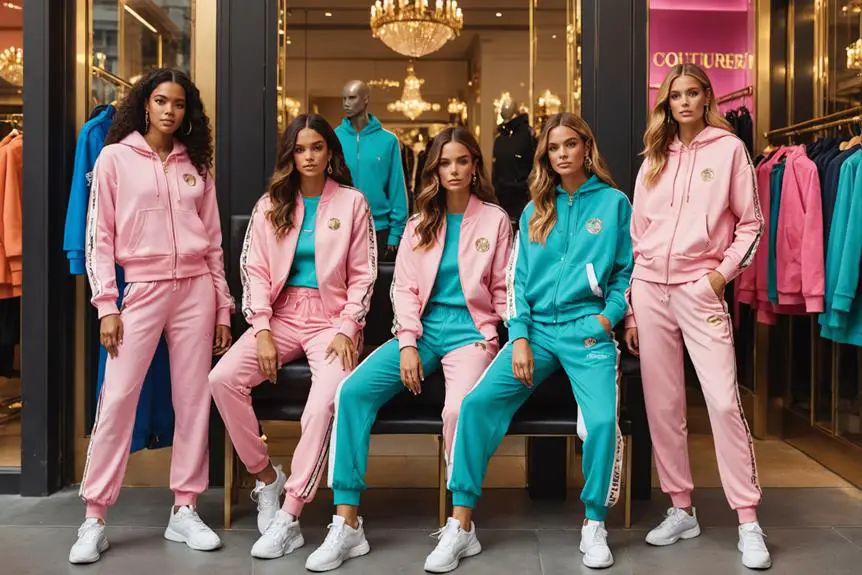
The current market position of Juicy Couture reflects a savvy response to evolving fashion dynamics, particularly within the thriving athleisure segment. The brand's ability to tap into nostalgia-driven consumers, especially during the pandemic, has solidified its relevance in contemporary fashion. Here are three key aspects that illustrate this:
- Strategic Collaborations: Juicy Couture's partnerships with Urban Outfitters and Vetements have broadened its audience, reinvigorating interest and showcasing its adaptability to market trends.
- New Collections: The launch of new collections priced between $30 to $400 caters to a diverse demographic, balancing affordability with a fashionable appeal that resonates with today's consumers.
- Market Presence: With the athleisure market accounting for 40% of online fashion sales in 2020, Juicy Couture has positioned itself as a significant player, demonstrating its capacity to navigate and thrive amid contemporary trends.
Cultural Impact and Legacy
Embodying the essence of early 2000s celebrity culture, Juicy Couture's velour tracksuits became more than just clothing; they emerged as a cultural phenomenon that defined an era. Worn by icons like Paris Hilton and Britney Spears, these tracksuits transformed into status symbols, reflecting the luxurious yet playful aesthetics of the time. Their prominence in popular media, showcased in films like "Mean Girls" and shows like "The Simple Life," solidified Juicy Couture's cultural relevance.
Over the years, the brand's low-rise pants and signature designs sparked defining trends in contemporary fashion, despite later critiques regarding fit and modesty. Celebrating its 25th anniversary amid a resurgence of Y2K nostalgia, Juicy Couture has found renewed interest in today's fashion landscape. This revival speaks volumes about the brand's lasting impact and adaptability.
Moreover, Juicy Couture's innovative marketing strategies positioned it as a pioneer of the athleisure trend, shaping discussions on luxury branding and consumer culture. By blending comfort with glamour, it not only influenced a generation but also ingrained itself into the fabric of fashion history, ensuring its legacy remains significant in the ever-evolving world of style.
Future Prospects and Trends
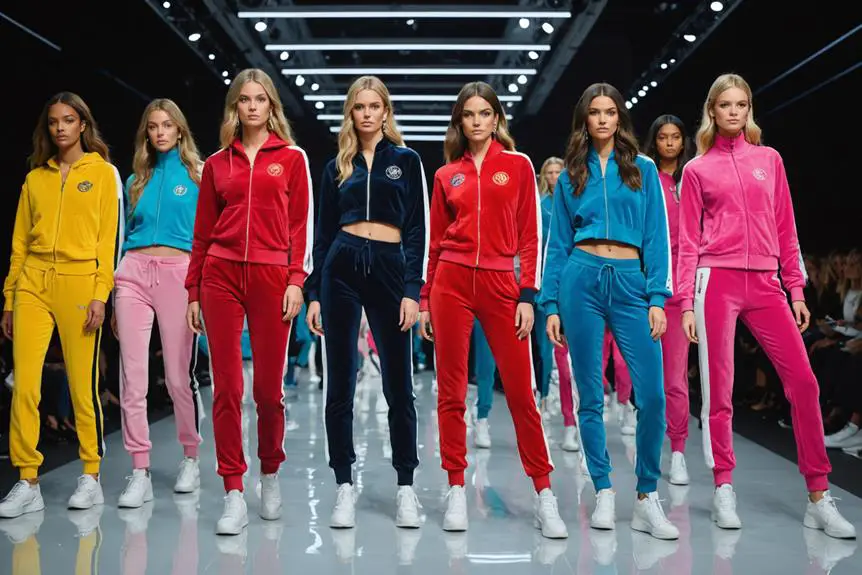
As nostalgia for early 2000s fashion continues to surge, Juicy Couture is strategically positioned to harness this trend and redefine its future. The brand's iconic velour tracksuits are at the forefront of the Y2K fashion revival, appealing to both former fans and a new audience.
To capitalize on this momentum, Juicy Couture can focus on three key strategies:
- Revamping Tracksuits: By introducing modern variations of their classic tracksuits, the brand can cater to the athleisure market, which accounted for 40% of online fashion sales in 2020.
- Innovative Collaborations: Continuing partnerships with contemporary brands like Vetements and Urban Outfitters will help maintain relevance and attract diverse consumer segments. These collaborations can reinvigorate the brand's image while preserving its nostalgic essence.
- Evolving Designs: Adapting to changing consumer preferences is essential. Juicy Couture's commitment to incorporating fresh designs while remaining true to its heritage will guarantee it resonates with both loyal customers and newcomers alike.
Frequently Asked Questions
What Are the Origins of Juicy Couture?
Juicy Couture originated in 1995 as Travis Jeans, focusing on maternity wear. By 1996, it rebranded, shifting to luxurious casual fashion, ultimately launching its iconic velour tracksuits that revolutionized loungewear style and comfort.
Why Did Juicy Couture Shut Down?
Juicy Couture shut down due to shifting consumer preferences, declining sales, and a failed changeover from luxury to discount retail. You'll see that oversaturation and a lack of brand alignment further hindered its relevance in the market.
What Is a Fact About Juicy Couture?
Juicy Couture, known for its luxurious velour tracksuits, skyrocketed to fame in the early 2000s. Its iconic style quickly became synonymous with celebrity culture, influencing fashion trends and consumer preferences during that vibrant era.
What Does Juicy Couture Represent?
Juicy Couture represents a fusion of luxury and comfort, epitomizing the athleisure trend. It captures a spirit of playful elegance, appealing to diverse audiences while celebrating inclusivity and the vibrant cultural shifts of its era.


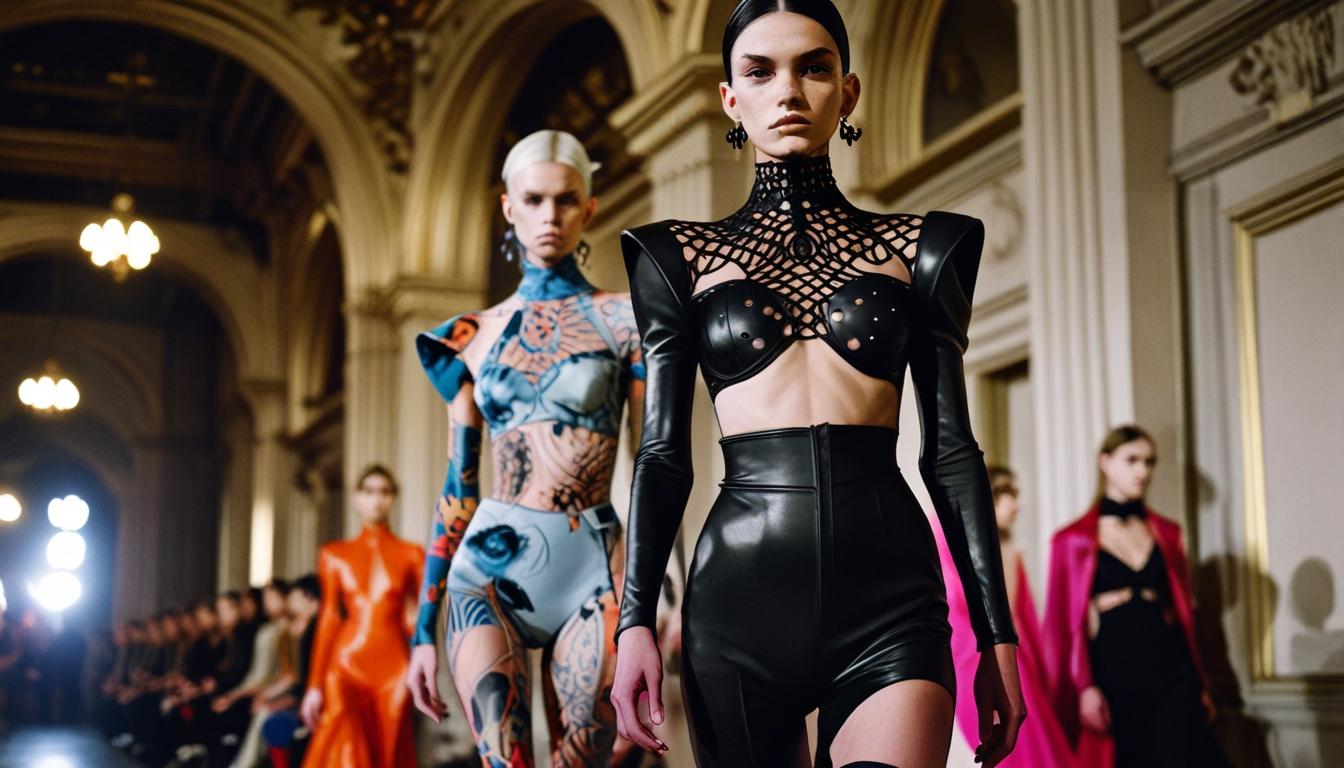

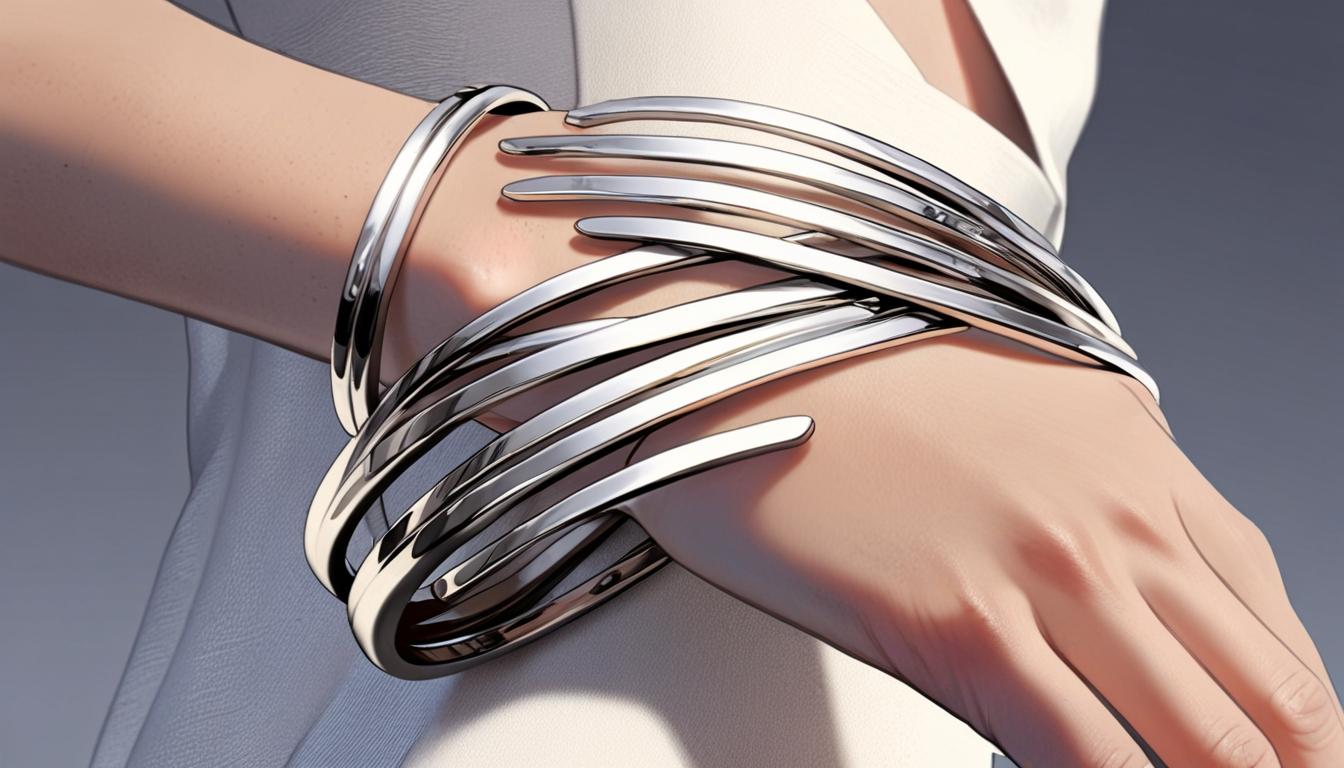
Your positive and uplifting words are like a ray of sunshine on a cloudy day Thank you for spreading light and positivity in the world
Your article helped me a lot, is there any more related content? Thanks!